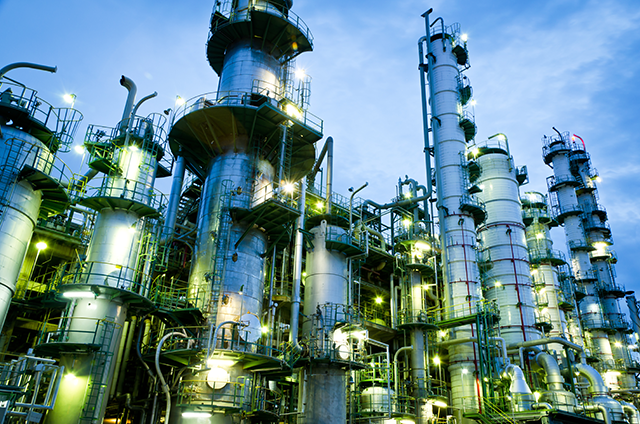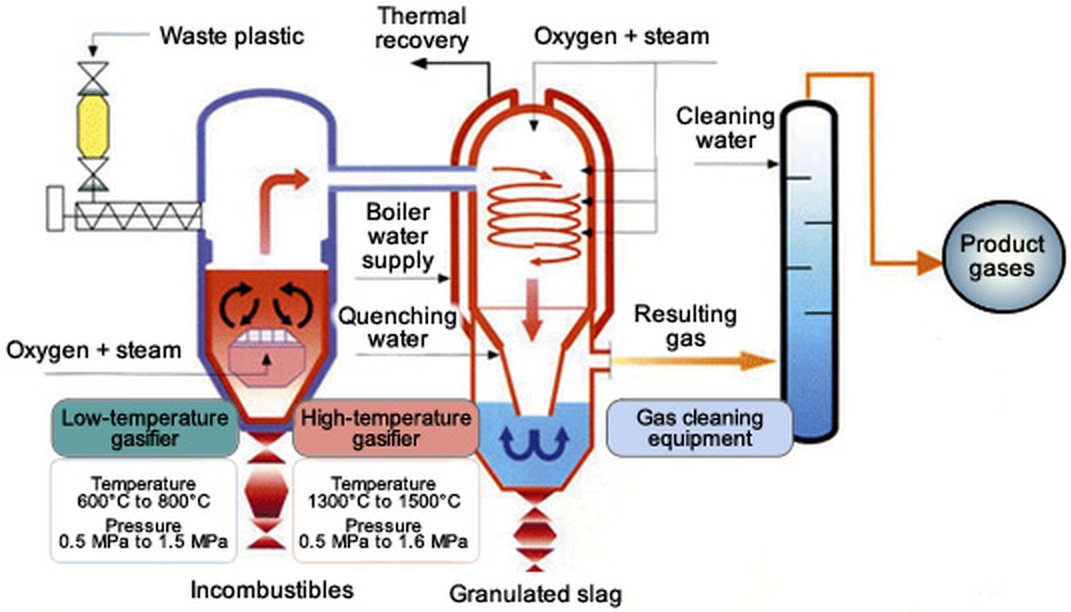Process Genesis and Ownership
The Ebara-UBE Process (EUP) Technology is a Two-Stage Pressure Gasification System (Fig. 1) for Chemical Recycling that has been jointly developed and commercialized by Ube Industries (now UBE Corporation) and Ebara Corporation[1]. The Process was patented as published in JP2000319670A with priority date March 10th 2000[2]. On May 7th 2010, UBE announced to have bought out the shares of Ebara Corporation in September 2007 and made EUP Co., Ltd. into a wholly-owned subsidiary and later to have absorbed the subsidiary in March 2008 to improve the profitability of the business[3]. The EUP Process is licensed by Technology Owner UBE Corporation and co-licensor Ebara Environmental Plant Co., Ltd. On Oct 6th 2020, the two companies announced that they have signed an agreement with JGC Corporation that gives JGC license to utilize the Ebara Ube Process (EUP) in Gasification Chemical Recycling of Waste Plastics[4].
Figure 1 - Pressurized Twin Internally Circulating Fluidized-Bed Gasification System (PTIFG)[1]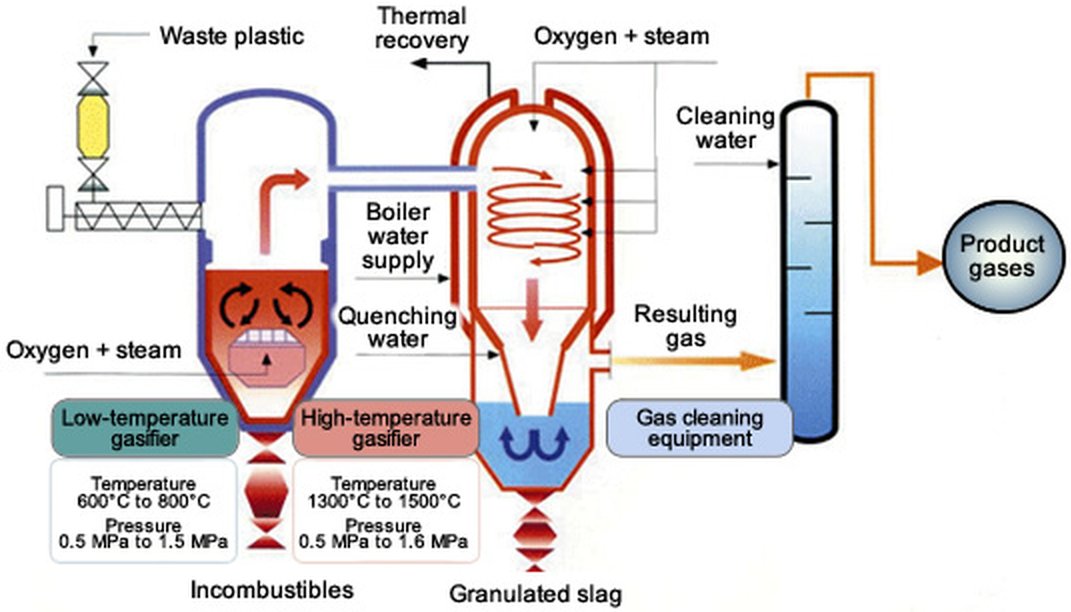
Process Description
Feedstock
The Feedstock comes from Municipal Waste that has been sorted and carried to the Plant in the form of Plastic Bales with any kind of Plastics including PVC acceptable, Metals are roughly removed, Plastics are crushed, heat-dried and pressed into Formed Granules with 2 cm x 5 cm dimensions.
Gasification Process
The Process is a Two-Stage Gasification of Plastic Waste using Partial Oxidation with Oxygen and Steam. The Pressurized Gasification Technology combines Ebara Environmental Plant's Fluidized-Bed Low-Temperature (600-800°C) Gasification Furnace with UBE Corporation's High-Temperature (1,300-1,500°C) Swirling-Type Slagging Gasification Furnace[1].
Products
The Process degrades the Plastics into Hydrogen and CO (Syngas), together with the separation of Metals, Ash Conversion into Slag, Water and Salt (NaCl). The Syngas is purified to remove CO2 and SOx.
Figure 2 - EUP System Block Flow Diagram[5]
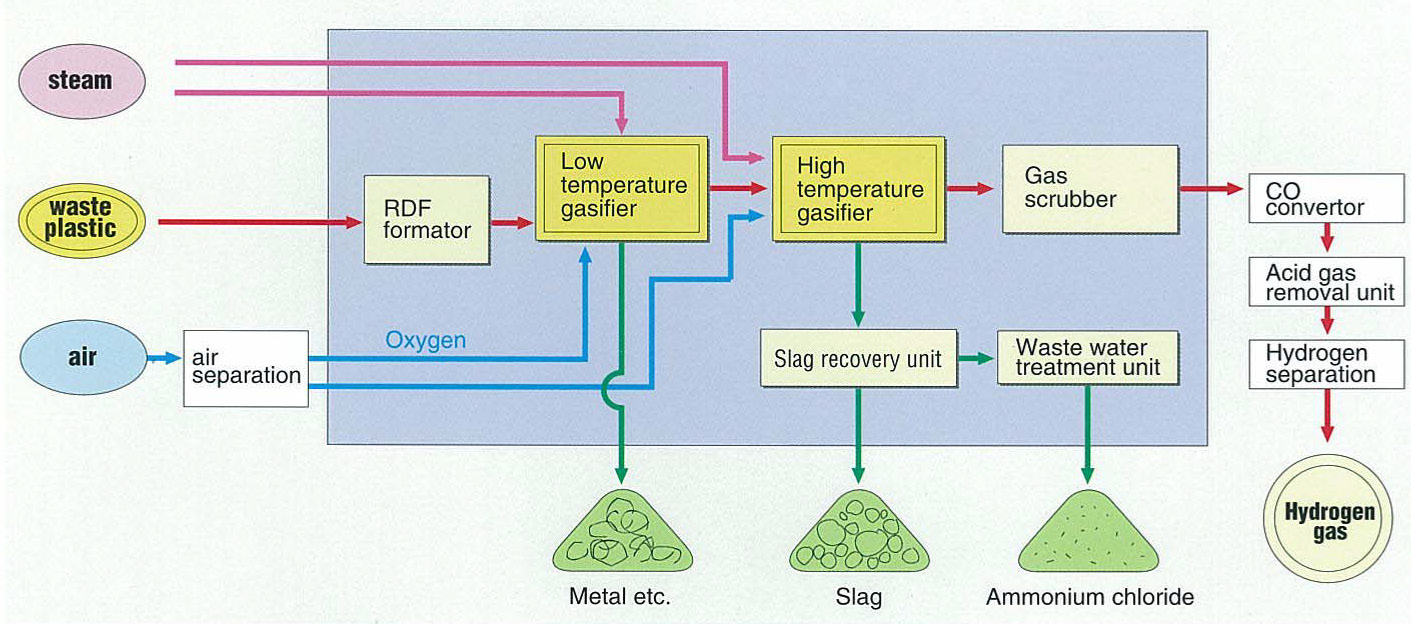
Co-Products
Inorganic Substances and Metals contained in Waste Plastics are recycled as part of the Two-Stage Pressure Gasification System. Inorganic Substances are recovered as Granulated Slag for use as a Raw Material in Cement and other Construction Materials, while recovered Metal Scraps can be recycled to significantly reduce the burden on final disposal sites[6].
Dioxines Emissions Control
EUP Technology fully addresses environment concerns over Synthesization and Resynthesization of Dioxins produced during Plastics Gasification. Dioxins are thermally decomposed in a High Temperature Gasifier at temperatures exceeding 1,300°C, then instantly cooling the Hot Gases under 200°C to prevent Dioxin Synthesization and Resynthesization[6].
Operating Plants
Formerly named Ube Industries,Ltd. announced on May 7th 2010 that it has decided to withdraw from the Ebara-Ube Process (EUP) business. Ube Industries and Ebara Corporation had originally established EUP Co., Ltd. in 2001 as a 50/50 joint venture to engage in the recycling of Waste Plastics and other Materials as prescribed under the Containers and Packaging Recycling Act[3]. The Plant located in Ube City with a Processing Capacity of 95 tonnes per day (approximately 35,000 tonnes per year), Yamaguchi Prefecture, was operating since 2001[7]. UBE's decision to close the Plant in June 2010 has been motivated by the scarcity of Waste Plastics and the lack of viable prospects for improving the profitability of the EUP business[3].
RESONAC (a rebranding of SHOWA DENKO K.K.) has been operating its “Kawasaki Plastic Chemical Recycling” (KPR) Facility since 2003 under the provisions of “The Law for Promotion of Sorted Collection and Recycling of Containers and Packaging”[8]. The plant has a processing capacity of 195 tonnes per day (approximately 70,000 tonnes per year)[7].
JGC Holding is claiming that EUP is the first and only Gasification Chemical Recycling Process which has long-term commercial operation track record[7]. Resonac is more recently claiming that it is the only company in the world that has been stably operating a Plant for Gasification and Chemical Recycling of Used Plastics for a long term [9].
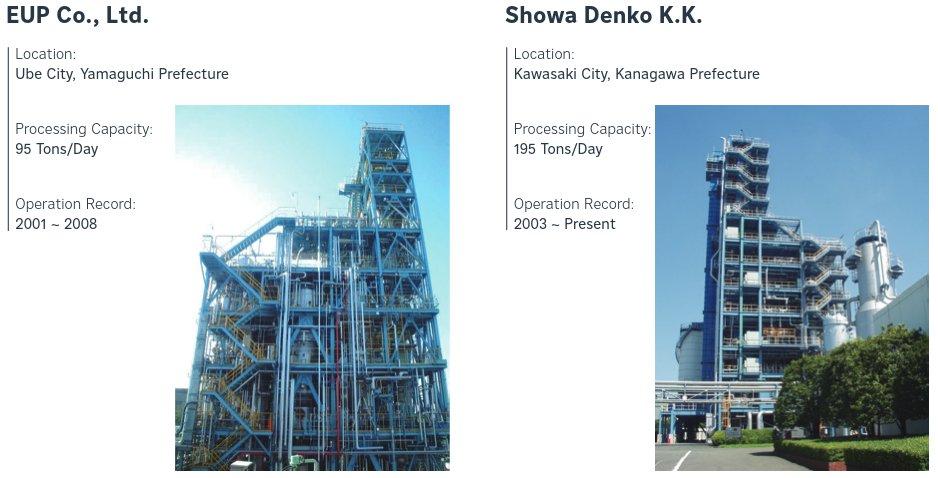
References
- Ebara Environmental Plants, Waste Treatment Facilities and Energy Plants, Gasification Technologies, Ebara Ube Process Pressurized twin internally circulating fluidized-bed gasification system
- JP2000319670A, TWO-STAGE WASTE GASIFICATION SYSTEM, Priority JP2000066631A·2000-03-10
- UBE Corporation, May 7th 2010, Ube Withdraws from Ebara-Ube Process Recycling Business
- UBE Corporation, Oct 6th 2020, Ube Industries and Ebara Environmental Plant Sign Agreement with JGC Corporation to License Ebara Ube Process (EUP)
- UBE Corporation, UBE Annual Report 2008
- UBE Corporation, April 20th 2005, Ube Industries and Ebara Corporation's Two-Stage Pressure Gasification System Wins Leading Science and Technology Award from Japanese Government
- JGC Holding Corporation, Oct 7th 2020, WASTE PLASTICS CHEMICAL RECYCLING BY GASIFICATION Catalogue
- RESONAC, Feb 9th 2022, Showa Denko Achieves Recycling of 1 Million Tons of Used Plastics in Total
- RESONAC, Dec 20th 2022, Showa Denko’s Low-Carbon Ammonia Produced from Used Plastics Reduces CO2 Emission by more than 80%


